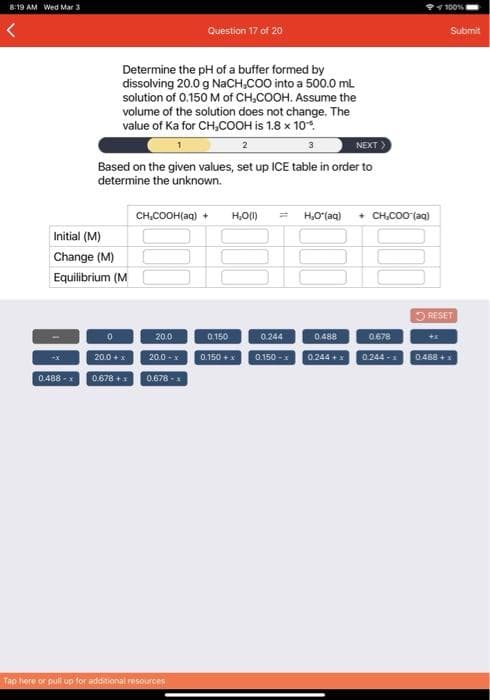Question 17 or 20 Subm Determine the pH of a buffer formed by dissolving 20.0 g NACH,COO into a 500.0 mL solution of 0.150 M of CH,COOH. Assume the volume of the solution does not change. The value of Ka for CH,COOH is 1.8 x 10 3 NEXT> Based on the given values, set up ICE table in order to determine the unknown. CH.COOH(aq) + H,O) H,O'(aq) + CH,CO0 (aq) Initial (M) Change (M) Equilibrium (M
Question 17 or 20 Subm Determine the pH of a buffer formed by dissolving 20.0 g NACH,COO into a 500.0 mL solution of 0.150 M of CH,COOH. Assume the volume of the solution does not change. The value of Ka for CH,COOH is 1.8 x 10 3 NEXT> Based on the given values, set up ICE table in order to determine the unknown. CH.COOH(aq) + H,O) H,O'(aq) + CH,CO0 (aq) Initial (M) Change (M) Equilibrium (M
Chapter14: Principles Of Neutralization Titrations
Section: Chapter Questions
Problem 14.33QAP
Related questions
Question

Transcribed Image Text:8:19 AM Wed Mar 3
100%
Question 17 of 20
Submit
Determine the pH of a buffer formed by
dissolving 20.0 g NACH,COO into a 500.0 mL
solution of 0.150 M of CH,COOH. Assume the
volume of the solution does not change. The
value of Ka for CH,COOH is 1.8 x 10*.
NEXT
2
Based on the given values, set up ICE table in order to
determine the unknown.
CH,COOH(aq) +
H,O(1)
H,O (aq) + CH,co0 (aq)
Initial (M)
Change (M)
Equilibrium (M
O RESET
20.0
20.0 -x
0244
0.150 - 0.244 + 0244 - 0.488 +1
0.150
0.488
0678
20.0 +x
0.150 +x
0.488 -x
0.678 -
0.678 +x
Tap here or pull up for additional resources
Expert Solution
This question has been solved!
Explore an expertly crafted, step-by-step solution for a thorough understanding of key concepts.
This is a popular solution!
Trending now
This is a popular solution!
Step by step
Solved in 7 steps

Knowledge Booster
Learn more about
Need a deep-dive on the concept behind this application? Look no further. Learn more about this topic, chemistry and related others by exploring similar questions and additional content below.Recommended textbooks for you


Chemistry: Principles and Reactions
Chemistry
ISBN:
9781305079373
Author:
William L. Masterton, Cecile N. Hurley
Publisher:
Cengage Learning



Chemistry: Principles and Reactions
Chemistry
ISBN:
9781305079373
Author:
William L. Masterton, Cecile N. Hurley
Publisher:
Cengage Learning


Chemistry
Chemistry
ISBN:
9781305957404
Author:
Steven S. Zumdahl, Susan A. Zumdahl, Donald J. DeCoste
Publisher:
Cengage Learning

Chemistry: An Atoms First Approach
Chemistry
ISBN:
9781305079243
Author:
Steven S. Zumdahl, Susan A. Zumdahl
Publisher:
Cengage Learning

Chemistry & Chemical Reactivity
Chemistry
ISBN:
9781133949640
Author:
John C. Kotz, Paul M. Treichel, John Townsend, David Treichel
Publisher:
Cengage Learning